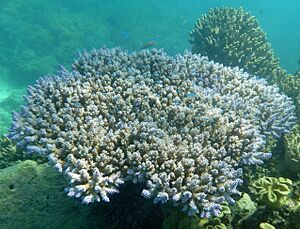Acropora valida facts for kids
Quick facts for kids Acropora valida |
|
|---|---|
 |
|
| Conservation status | |
| Scientific classification |
|
| Kingdom: | Animalia |
| Phylum: | Cnidaria |
| Class: | Anthozoa |
| Order: | Scleractinia |
| Family: | Acroporidae |
| Genus: | Acropora |
| Species: |
A. valida
|
| Binomial name | |
| Acropora valida (Dana, 1846)
|
|
| Script error: The function "autoWithCaption" does not exist. | |
| Synonyms | |
|
List
|
|
Script error: No such module "Check for conflicting parameters".
Acropora valida is a type of coral that lives in the ocean. It belongs to a family of corals called acroporids. You can find this coral in warm, shallow parts of the ocean. It usually lives in coral reefs about 1 to 15 meters deep. These corals are important parts of healthy ocean ecosystems.
Contents
About This Coral
How Scientists Name It
Scientists give every living thing a special name. This helps them study and understand it. The Acropora valida coral was first named Madrepora valida. A scientist named Dana described it in 1846.
What It Looks Like
Acropora valida corals grow in groups called colonies. These colonies can be different shapes. They can grow quite large, sometimes more than half a meter wide. This coral has tiny structures called corallites. These are like small cups where the coral polyps live. The coral can be brown, cream, or yellow. Sometimes, the tips of its branches are purple. It looks a bit like another coral called Acropora variabilis.
Where It Lives
This coral lives in many parts of the world's oceans. You can find it in the Red Sea and the Gulf of Aden. It also lives in parts of the Indian Ocean and the Persian Gulf. It is found across the central Indo-Pacific region. This includes places like Australia, Southeast Asia, and Japan. You can also see it in the East China Sea. It lives in the Pacific Ocean, including the northwestern Hawaiian Islands and Johnston Atoll. It prefers tropical shallow reefs. It can live in many different types of reef habitats.
Why It Needs Our Help
The Acropora valida coral is currently listed as a "least concern" species. This is on the IUCN Red List. However, scientists believe its numbers are going down. This is happening because coral reefs around the world are shrinking. It is also listed under Appendix II of CITES. This means its trade is controlled to protect it.
We don't know exactly how many of these corals there are. But they face many threats. These threats include rising ocean temperatures. This can cause coral bleaching, which harms corals. Climate change is also a big problem. Human activities, like pollution, can hurt them too. Even natural predators, like the Crown-of-thorns starfish (Acanthaster planci), can damage reefs. Diseases can also affect the corals. Protecting coral reefs is very important for all ocean life.
 | Aaron Henry |
 | T. R. M. Howard |
 | Jesse Jackson |


